#the variants and daughters of aphrodite
Text
Some general thoughts on the gods on Troy's side, and why they might be:
Aphrodite: Presumably out of affection for her son, Anchises, and Paris. Very potentially, wanting to assure the gift she's given Paris lasts as long as possible? But if this is a factor, hardly something she is beholden to in any way; it'd probably be more about her own pride in that case.
But, given that she also helps protect Hektor's corpse, when he, at least, is no longer able to pay her back for such aid, her affection/aid to the Trojans aren't just for or because of those three.
Apollo: Thetis' warning/prophecy to her son that killing Tennes/a son of Apollo would mean Apollo would kill him (Plutarch, Quaest. Graec. 28, Bibliotethe, Epitome 3.26), then we have Achilles killing Troilus in his sancuary, which would be reason enough on its own but Troilus can also be Apollo's son. There's Apollo so ardently protecting Hektor throughout the war, even/maybe especially after his death (Hektor is also in several sources Apollo's son).
Also his relationship with Hecuba and how in Stesichorus he rescues her. (Could also put Kassandra and Helenos here.)
Part of his defense of Troy might be about "fate" and when it's the "proper time" for Troy to fall, but Apollo's ties to Troy/individuals attached to Troy are more deep-set than that. He is the one to punish Neoptolemos' sacrilege of killing Priam at Zeus' altar. Apollo is also rarely present during vase art scenes around the Judgment, potentially connecting to; Apollo specifically being the one to aid Paris (or in some variants, using Paris' shape) to kill Achilles. Real-world wise, the possibility of connecting Apaliuna(s)/Appaluwa as Wilusa/Troy's patron god to Apollo.
Ares: Unstable ally. Hard to say how consistently he is on either side; Athena says he "only yesterday" on the first day of fighting in the Iliad was loudly pledging to Hera and Athena that he'd help the Achaeans.
Perhaps he's been aiding the Trojans more or less secretly/openly throughout the war, as much because he supports whatever side he wishes on a whim as that Aphrodite (and Apollo?) has asked him to. Either way, certainly not as consistent nor out of any particular affection or feeling of protectiveness for the Trojans.
Artemis: "For, in her pity, holy Artemis is angry at the winged hounds of her father, for they sacrifice a wretched timorous thing, together with her young, before she has brought them forth. An abomination to her is the eagles' feast." (Agamemnon, Aeschylus, line 135) ; this is about the eagles and hare omen, which replaces (or in addition to, as this seems to have happened in Mycenae) the snake and sparrows one. Artemis is put forth as unhappy with Troy's (future) fall/the war.
And, it's of course very easy to see the demand for Iphigenia in reparation for Agamemnon's hubris in a similar way, that if he/the army, wants to go off and kill/enslave innocents elsewhere, he/they has to start at home. She may also be helping her brother, and there is the Skamandrios, son of Strophios, who she herself taught to hunt in the Iliad.
She has independent connections to Troy, and could be one of the more focused on Trojan deities along with her brother and their mother.
Leto: We have nothing, aside from the fact that she is on the Trojan side with her children in Book 21.
But real-world-wise, there's also that Leto was an important goddess on the coast, and in Lycia connected to a Lycian mother goddess. So one could probably make inference for the in-universe reason being as much her siding with her children as that Troy is honouring her (maybe particularly so), along with the rest of the countries on the coast.
Xanthos: intimately woven together with Troy's royal family, as he's married a couple daughters into the line and his (only?) son's daughter married Dardanos.
Zeus: He's technically/actually neutral, a driving force to keep the war going as it "needs to". He's therefore on Troy's side more through the sentiment(s) he expresses or is assigned to him rather than in action.
Particularly so if one turns to the "he planned the war" variants - but these are never about Troy, or Paris, but rather about something much larger than any fault any individual Trojan or Troy has a whole as made themselves guilty of. [Though individual mortals in the Iliad, and in later sources, both tragedies and lyric, will imply that it's Zeus as god of xenia that ensures his working towards Troy's destruction, rather than any plan that has little to do with Troy.]
For his connections to and being for Troy, have Proclus' summary of the Kypria for example, where the plan mentioned at the end is to "relieve the Trojans" specifically, and that phrasing turns Achilles' anger and Zeus acting to fulfil his demands not about Achilles' honour, but about aiding Troy. In Pindar's Paean 6 (fragmentary), Zeus is said to "not dare to change fate [the destruction of Troy]", easily to implicate that he otherwise might, because he would wish to.
More important, perhaps, is his statement that Troy is his most favoured city, and how Hera offers up three of her favoured cities for Zeus' one, how he wishes to save Hektor, and the description in the Iliad (by Poseidon) that Dardanos was the/one of the sons [by mortal women, though Elektra couldn't have been that] that he loves the most.
41 notes
·
View notes
Text
Is theoi a great and useful site? Absolutely. Is it 100% reliable? Absolutely not, and this should always be kept in mind.
Here is one instance of misleading information you can find on the site: On the Charites page, in the parentage section, multiple passages from Nonnos' Dionysiaca are quoted. One of them goes:
"[The ghost of Ariadne addresses her husband Dionysos :] ‘I will say nothing of the [your] love of Kronois (Cronoïs), from whose bed were born the three Kharites (Charites, Graces) ever inseparable.'"
[N.B. Kronois, "the daughter of Kronos," was a title of Hera who was sometimes named as the mother of the Kharites. In another tradition, Dionysos was their father. Combining these two traditions was impossible, so Nonnus invented a nymphe named Kronois as mother of the girls by the god.]
Now the thing is, the mother of the Charites by Dionysos in that passage is actually named KORONIS (Nonnos, Dionysiaca 48.548), and while Hera is indeed called "daughter of Kronos" (θύγατερ μεγάλοιο Κρόνοιο and similar), "Kronois" is not, to the best of my knowledge, actually a title of hers. Besides, Nonnos combines different and contradictory traditions very freely: at one point in the Dionysiaca Pasithea is the daughter of Dionysos, at another the daughter of Hera; at one point Eros is born during Aphrodite's marriage to Hephaistos, at another Aphrodite emerges from the sea pregnant with him and gives birth immediately. So why would Nonnos need to invent a nymph in order to combine two contradictory variants in this specific case?
34 notes
·
View notes
Text
Prende
Prende or Premte is the goddess of dawn, love, beauty, fertility, health and protector of women, in the Albanian pagan mythology. She is also called Afër-dita, an Albanian phrase meaning "near day", "the day is near", or "dawn", in association with the cult of the planet Venus, the morning and evening star. Her sacred day is Friday, named in Albanian after her: e premte, premtja (Gheg Albanian: e prende, prendja). In Albanian mythology Prende appears as the daughter of Zojz, the Albanian sky and lighning god.
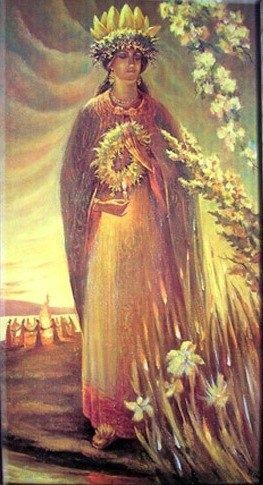
Thought to have been worshiped by the Illyrians in antiquity, Prende is identified with the cult of Venus and she was worshipped in northern Albania, especially by the Albanian women, until recent times. Originally a pre-Christian deity, she was called "Saint Veneranda" (ShënePremte or Shën Prende), identified by the Catholic Church as Saint Anne, mother of Virgin Mary. She was so popular in Albania that over one in eight of the Catholic churches existing in the late 16th and the early 17th centuries were named after her. Many other historical Catholic and Orthodox churches were dedicated to her in the 18th and 19th centuries.
Dialectal variants include: Gheg Albanian P(ë)rende (def. P(ë)renda), Pren(n)e (def. Pren(n)a); Tosk Albanian: Premte (def. Premtja), Preme (def. Prema).
Prende is also called Afërdita (Afêrdita in Gheg Albanian) in association with the cult of the planet Venus, the morning and evening star, which in Albanian is referred to as (h)ylli i dritës, Afërdita "the Star of Light, Afërdita" (i.e. Venus, the morning star) and (h)ylli i mbrëmjes, Afërdita (i.e. Venus, the evening star). Afër-dita, an Albanian phrase meaning "near day", "the day is near", or "dawn", is the native Albanian name of the planet Venus. Afro-dita is its Albanian imperative form meaning "come forth the day/dawn".
The Albanian translation of "evening" is also rendered as πρέμε premë in the Albanian-Greek dictionary of Marko Boçari.
In northern Albania, Prende is referred to as Zoja Prenne or Zoja e Bukuris "Goddess/Lady Prenne" or "Goddess/Lady of Beauty".
The Albanian name Premtë or P(ë)rende is thought to correspond regularly to the Ancient Greek counterpart Περσεφάττα (Persephatta), a variant of Περσεφόνη (Persephone). The theonyms have been traced back to the Indo-European *pers-é-bʰ(h₂)n̥t-ih₂ ("she who brings the light through").
The Albanian phrase afro dita 'come forth the day/dawn' traces back to Proto-Albanian *apro dītā 'come forth brightness of the day/dawn', from Indo-European *h₂epero déh₂itis. The theonym Aprodita is attested in Messapic inscriptions in Apulia.
In the Albanian pagan mythology Prende is the goddess of dawn, love, beauty, fertility and health. She is considered the Albanian equivalent of the Roman Venus, Norse Freyja and Greek Aphrodite.
According to some Albanian traditions, Prende is the daughter of Zojz, the Albanian sky and lightning god. Associated with the dawn goddess, the epithet "daughter of the sky-god" is commonly found in Indo-European traditions.
According to folk beliefs, swallows, called Pulat e Zojës "the Lady's Birds", pull Prende across the sky in her chariot. Swallows are connected to the chariot by the rainbow (Ylberi), which the people also call Brezi or Shoka e Zojës "the Lady's Belt".
The common Albanian name nepërkë for the venomous snake adder, viper appears in the Arbëresh variety of Calabria as nepromtja, probably based on Prende / Premte.
5 notes
·
View notes
Text
Myrrha and Cinyras
Perhaps you have heard of Adonis, lover to Aphrodite and Persephone, the most beautiful man in the Classical Antiquity. What you may not have know is that Adonis is the fruit of a incestuous relationship between Myrrha (also called Smyrna in some texts) and her father Cinyras (other times names Theias).
The most well known version of the myth comes from Ovid's Metamorphoses, published in 8 CE, but the myth is older than that, and other variants of it survive to this day. For the Metamorphoses, I'll be using Brookes More's translation from 1922, with the revisions from 1978.
Metamorphoses, by Ovid
The poem about Myrrha can be found in Book X, starting in line 298, under the title Myrrha Transformed to a Tree. It consists of Orpheus telling an audience of the origin of the myrrh tree.
Myrrha had her pick among suitors, but who she really wanted was her father, Cinyras, King of Cyprus. She knows that her desire is wrong, although she also knows that it's not technicaly a crime:
"Ah, may the sacred rights of parents keep this vile desire from me, defend me from a crime so great—If it indeed is crime. I am not sure it is— I have not heard that any god or written law condemns the union of a parent and his child."
And complains she wasn't born in a land where mothers and son, as well as fathers and daughters, can get together:
"But it is said there are some tribes today, in which the mother marries her own son; the daughter takes her father; and by this, the love kind Nature gives them is increased into a double bond. Ah wretched me! Why was it not my fortune to be born in that love-blessed land?"
Cinryas comes to asks Myrrha which of the suitors she wants to marry and she cries in her father's arms, saying that she wants a husband like him, to which he replies that she's a loving daughter. That night, knowing she would have to a pick a husband soon, Myrrha decides that, since she can't wed her father, it's better to hang herself.
As she prepares to do so, a maid enters and room and stops her. The maid asks what's upsetting Myrrha, and, at first, she refuses to answer. Eventually, Myrrha confesses her love for Cinryas and the maid promises to help.
Luckly for Myrrha, her mother is away celebrating the festival of Ceres (Demeter), so Cinryas is drunk and alone. The maid tells him that a beautiful girl is interested in being his mistress and, furthermore, she's Myrrha's age. Cinryas gets interested and tells the maid to bring in the girl. Even thought she felt great guilt, that night Myrrha goes to her father's bedroom.
Officially, it's said that Cinryas doesn't recognizes Myrrha, but I call that bullshit. He must have wanted his daughter in some level, as I believe he had accepted this girl only because she was Myrrha's age. And he then he goes on to call the 'unknown girl' "daughter"? As if he's roleplaying her being Myrrha.
He chanced to call her “daughter,” as a name best suited to her age; and she in turn, endearing, called him “father”, so no names might be omitted to complete their guilt.
She returns to Cinryas room many nights, and they always have sex in the dark, until one day Cinryas decides to light the room and see the face of his new mistress. In shock, he learns that it's Myrrha he has been sleeping with. This reminds me of Eros and Psyche, when Psyche hides a candle so she can see her husband and then tragedy ensues.
Upon seeing Myrrha, Cinryas gets his sword and tries to kill her, but she runs. For nine months she wanders the land while pregnant, until she's too tired and begs the gods to help her. They anwser by transforming her into a myrrh tree.
The baby she conceived with her father is birthed from her tree form with the help of the goddess of childbirth and grows to become a beautiful man, handsome enough to win the love of Venus (Aphrodite), which is a poem of it's own.
"That son of sister and grandfather, who was lately hidden in his parent tree, just lately born, a lovely baby-boy is now a youth, now man more beautiful than during growth."
So this thing about incest-babies being always 'deformed' and 'retarded' is a modern invention. These ancient stories have the offspring of incestuous unions as being beautiful enough to marry a King or a Goddess and strong and wise enough to become a leader themselves.
Fabulae, by Hyginus
Another ancient collection of tales, the Fabulae by Hyginus, written circa 1 CE (before Metamorphoses) gives a similar account to the previous one in the Chapter 58:
Smyrna was the daughter of Cinyras, King of the Assyrians, and Cenchreis. Her mother Cenchreis boasted proudly that her daughter excelled Venus in beauty. Venus, to punish the mother, sent forbidden love to Smyrna so that she loved her own father. The nurse prevented her from hanging herself, and without knowledge of her father, helped her lie with him. She conceived, and goaded by shame, in order not to reveal her fault, hid in the woods. Venus later pitied her, and changed her into a kind of tree from which myrrh flows; Adonis, born from it, exacted punishment for his mother's sake from Venus.
Chapter 242 of the same book says that Cinyras killed himself once he discovered he laid with his daughter.
Bibliotheca, by Apollodorus
Bibliotheca of Pseudo-Apollodorus, written around 1st century CE, is a collection of Greek poems and stories, and it was attributed to Apollodorus, until they realized it hadn't been him to write it and so it became Pseudo-Apollodorus. But anyway, I bring up this texts because it offers three possible origins for Adonis in Book III, chapter XIV. Two of them are not relevant for us, but the third one is. Using Panyasis as his source, Pseudo-Apollodorus, says that Adonis was the son of Thias, King of Assyria, and his daughter, Smyrna.
In consequence of the wrath of Aphrodite, for she did not honor the goddess, this Smyrna conceived a passion for her father, and with the complicity of her nurse she shared her father's bed without his knowledge for twelve nights. But when he was aware of it, he drew his sword and pursued her, and being overtaken she prayed to the gods that she might be invisible; so the gods in compassion turned her into the tree which they call smyrna (myrrh).
Metamorphoses, by Antoninus Liberalis
Written between 2nd and 3rd century CE, its the most recent among these selected texts. This account is very similar to the others, with the major difference being that Thias never tries to kill Smyrna. Here, their affair lasts months and when he shines the light on her, she gives birth in shock of being found out. She's then transformed into a tree by Zeus and Thias kills himself.
#father x daughter#parent x child#shipcest#greek mythology#proship#filicest#mythology review#metamorphoses#ovid#Fabulae#Hyginus
5 notes
·
View notes
Note
do u have any ocs? just wonderin
Why yes, anon, I do have ocs.
...
idk if you wanted to hear about them BUT YOU'RE GONNA HEAR ABOUT THEM ANYWAY:
(btw the crossover ocs are at the very end)
DC (which is mostly batfam but whatever):
Ruby Kyle, who you can read about here (she also has a fic!)
Ashlynn Todd! Jason's twin, I don't have much lore behind her but she hates Bruce and basically left the family after Jason's death, and unlike her twin, never returned. She isn't considered part of the Batfam.
Lilith Bleak, Klarion the Witch Boy's sister. Don't have much lore for her, but she dated Zatanna to piss off her brother.
MARVEL:
Camryn Barnes, she's a mulitversal variant of Clint and is the main character of my Artemis & Apollo duology. That I will totally get to.
Nova Belova, also part of the Artemis & Apollo duology, they're a variant of Natasha.
Alina Maximoff. Wanda and Pietro's triplet.
STAR WARS:
FT-0001, but better known as Alaia. You can find her story here.
Go check out @rigged-from-the-start. I own Ziana Ma'a, Kaos/Asha/Aaura Ma'a, Lydia Ma'a, and Theodosia Skywalker ONLY.
Theta, Omega's older sister and unpaid babysitter.
Asilla Meryn, Senator of Leiota
RIORDANVERSE:
Hali Jackson, Percy's twin and Huntress of Artemis
CROSSOVER OCS:
Marvel x DC:
Darasuum/Eternity, who you can read about here.
I have a wattpad story that I should really continue here, but the oc is Mariama el-Faouly-Spector(-Grant-Lockley) who's a crossover oc, she's in young justice.
Mira Grayson, who you can read about here
Jordan Lance-Queen AKA Blackbird, Eira Henderson-Sanchez AKA Mariposa, Jae Kim AKA Ghost, Dominic "Dom" Xavier AKA Glitch, Andromeda "Andi" Wayne AKA Siren, are all in my fic "The Thing About Love" which you can find here. It's a YJ/DC x X-MEN fic.
Hazbin Hotel/Helluva Boss x YJ:
Jester, you can read her story here.
Marvel x PJO
Maria "Mari" Stark, daughter of Eros and Tony Stark. (eros literally went "OO FINE MAN" and then did the do with tony ok we done bye)
Rebecca "Beck" Barnes, daughter of Aphrodite and Bucky Barnes. Beck will get a story on my wattpad, maybe crossposted here.
Adelaide Melina Romanoff, daughter of Athena and Natasha Romanoff. I kinda wanna explain this one, because I know it sounds weird. But Annabeth describes the way Athena "gets pregnant" by saying that Athena has a strong mental connection to a person, and that's "the truest form of love." At least to the wisdom goddess. So it's possible for Athena to "fall in love" with a woman and still have a child.
There are more but this is the most i can come up with rn...
sorry there's so many anon!
15 notes
·
View notes
Text
Today Esperanza as...
Series 6 Post 7: Goddess of the sky, the sun, joy, sexuality, motherhood, music, dance, foreign lands and merchandise, as well as the afterlife.
🌸 Her name, as better explained by the variant with which it is very commonly written, means "House of Horus" probably referring to the myth according to which Horus, identified as celestial falcon-god and sun-god, at the end of his journey through the heavens, in the evening he would have returned to the mouth of Hathor to spend the night there, enjoy a restful sleep and re-emerge again in the guise of the morning sun.
🌸 Hathor assimilated a large number of local divinities, thus accumulating an extremely varied mythology and attributes to the point of being considered simultaneously mother, wife and daughter of Ra and mother of Horus (like Isis); she was associated with Bastet. The ancient Greeks associated it with Aphrodite.
🌸 A special veneration was reserved for her by women, of whom she embodied and protected the roles of mother, wife and lover represented by the multifaceted family relationships that the myths attributed to her. Hathor had a complex bond with the sun-god Ra: at times, she could be considered the eye of Horus, her daughter or her mother. She absorbed this role, by syncretism, from the celestial cow Mehetueret, who in a creation myth acted as the mother of Ra and carried him between her horns.
🌸Hathor was the principal deity of sex in ancient Egypt, and the Greeks identified her with Aphrodite as soon as they came into contact with Egyptian religion. Because of her connection to love, the Egyptians believed that Hathor inspired sexual desire through music and dance. In one myth, Hathor danced naked in front of a sulking Ra until she managed to make him laugh. When Ra was not with Hathor, she fell into a deep depression: in fact she was also the goddess of joy.

#singmovie#sing2#singfanart#illuminationetertainment#esperanza#esperanzasingmovieoc#esperanzathefox#redfox#originalcharacter#oc#goddesshathor#egyptianmyth#e fuori a pantheon
1 note
·
View note
Photo

ISFP - 3w4 371 Sx/So - ESI - Slytherin - Daughter of Aphrodite - Dauntless - Chaotic Evil - Melancholic - Aesthetic Grunge Girl
#isfp#3w4#371#sx/so#ESI#slytherin#daughter of aphrodite#dauntless#chaotic evil#melancholic#aesthetic#grunge#girl#mbti#enneagram#tritype#instinctual variants#socionics#hogwarts houses#son/daughter of aphrodite#divergent#d&d#dugeons and dragons#temperament#moodboards#frikiembti
8 notes
·
View notes
Text
How to Build Apollo in DnD 5e

That’s right, today we’re tackling a herculean task by trying to build the golden boy of the Olympic Gods: Apollo. Now, obviously, we can’t build Apollo as an actual factual literal god, it would break the game and it would be preposterous. However, Apollo translates really nicely into DnD. He has many skills, multiple powers so that we don’t have to pad his spell list with crap, and he’s also shown off his fighting style across multiple myths and legends. Keep in mind that while I am using Apollo himself as our template, this is also a GREAT resource for if you want to play as a Demigod child of Apollo (such as Will Solace), a worshipper of Apollo, Apollo’s chosen champion, or if Zeus has condemned your godly gloriousness into the pimply awkward adolescent body of one Lester Papadopoulos.
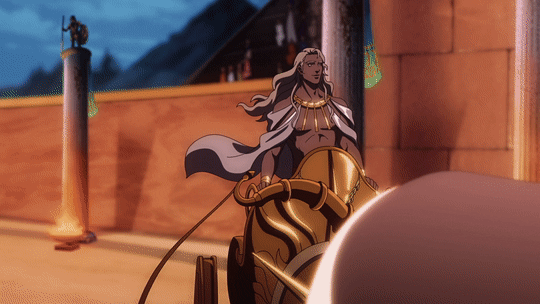
To start things off, we should examine Apollo’s many skills, abilities, and his MANY MANY MANY domains as a god.
Athletics - Apollo is the god of athleticism, though he shares this domain with Hermes. The original Olympic Games were held in his honor, young Greek boys held him up as the ideal of masculine physicality, and they still crowned winners with his sacred laurel wreath long after the games stopped being held for him.
Animal Handling - Before giving them to Hermes, Apollo was a pastoral god with a herd of cattle, and he also has horses that draw his solar chariot across the sky. There’s also art showing Apollo riding on the back of a swan, and he had a crow as his sacred messenger at least until he got angry and burned its feathers black.
History - Apollo’s been around a long time, and more importantly, he’s the second smartest and the second wisest of all the gods after only Athena herself. He invented mathematics, and two of his muse daughters embody history and astronomy, big staples of Ancient Greek scholarly rhetoric. A third daughter covers epic poetry which by modern standards would make her the muse of novels and plot-driven storytelling.
Intimidation - Diomedes carved a bloody canyon through the Trojan forces, but one threat from Apollo was all it took for him to scamper off with his tail between his legs.
Medicine - Apollo is the god of medicine, and as such, would be good at healing and checking for injuries.
Performance - This one’s a no-brainer, Apollo is the god of music, the father of the muses and the demigod Orpheus, and beat pan in a well-known musical battle.
Perception - Apollo is the god of prophecy, it’s hard to get the drop on a guy who may have seen your attack coming 30 years before you tried anything.
Persuasion - With the possible exception of Zeus and Aphrodite, Apollo is definitely a contender for the largest list of lovers by a single Olympian God. They had a terrible penchant for ending poorly, and he didn’t always pass his persuasion checks, but dang it if he didn’t try his hardest.
Religion - Apollo is a god. This is where I’d put any skill check for knowledge of Greek mythology, such as remembering myths, legends, heroes, demigods, the weaknesses of monsters, and mythological artifacts.
Now that we’ve covered Apollo’s skills that we should aim to provide him with, let’s examine his domains and abilities for appropriate spells, and figure out what spell lists he needs to be pulling from.
Magical Abilities

Archery/Athleticism
Divine Favor (Paladin, War Cleric)
Heroism (Bard, Paladin, Battle Smith Artificer, Order Cleric, Peace Cleric)
Hunter’s Mark (Ranger, Vengeance Paladin)
Jump (Artificer, Druid, Ranger, Sorcerer, Wizard)
Longstrider (Artificer, Bard, Druid, Ranger, Wizard)
Zephyr Strike (Ranger)
Cordon of Arrows (Ranger)
Enhance Ability (Artificer, Bard, Cleric, Druid, Ranger, Sorcerer, Wizard, Glory Paladin)
Conjure Barrage (Ranger)
Crusader’s Mantle (Paladin)
Flame Arrows (Artificer, Druid, Ranger, Sorcerer, Wizard)
Haste (Artificer, Sorcerer, Wizard, Land Druid (Grassland), Glory Paladin, Vengeance Paladin)
Lightning Arrow (Ranger)
Skill Empowerment (Artificer, Bard, Sorcerer, Wizard)
Conjure Volley (Ranger)
Steel Wind Strike (Ranger, Wizard)
Swift Quiver (Ranger)
Disease
Inflict Wounds (Cleric, Oathbreaker Paladin)
Ray of Sickness (Sorcerer, Wizard, Death Cleric)
Ray of Enfeeblement (Warlock, Wizard, Death Cleric, Grave Cleric)
Vampiric Touch (Sorcerer, Warlock, Wizard, Death Cleric, Grave Cleric)
Blight (Druid, Sorcerer, Warlock, Wizard, Death Cleric, Grave Cleric, Oathbreaker Paladin, Alchemist Artificer)
Sickening Radiance (Sorcerer, Warlock, Wizard)
Vitriolic Sphere (Sorcerer, Wizard)
Contagion (Cleric, Druid, Oathbreaker Paladin, Undying Warlock)
Harm (Cleric)
Fire
Create Bonfire (Artificer, Druid, Sorcerer, Warlock, Wizard)
Firebolt (Artificer, Sorcerer, Wizard)
Burning Hands (Sorcerer, Wizard, Light Cleric, Wildfire Druid, Fiend Warlock, Genie Warlock (Efreeti))
Hellish Rebuke (Warlock, Oathbreaker Paladin)
Aganazzar’s Scorcher (Sorcerer, Wizard)
Dragon’s Breath - Fire* (Sorcerer, Wizard)
Flaming Sphere (Druid, Wizard, Alchemist Artificer, Light Cleric, Celestial Warlock)
Heat Metal (Artificer, Bard, Druid, Forge Cleric)
Scorching Ray (Sorcerer, Wizard, Artillerist Artificer, Light Cleric, Wildfire Druid, Fiend Warlock, Genie Warlock (Efreeti))
Fireball (Sorcerer, Wizard, Artillerist Artificer, Light Cleric, Fiend Warlock, Genie Warlock (Efreeti)
Flame Stride (Artificer, Ranger, Sorcerer, Wizard)
Fire Shield (Wizard, Wildfire Druid, Armorer Artificer, Battle Smith Artificer, Fiend Warlock, Genie Warlock (Efreeti))
Wall of Fire (Druid, Sorcerer, Wizard, Artillerist Artificer, Light Cleric, Forge Cleric, Celestial Warlock, Fiend Warlock)
Flame Strike (Cleric, Wildfire Druid, Devotion Paladin, Glory Paladin, Celestial Warlock, Fiend Warlock, Genie Warlock (Efreeti))
Immolation (Sorcerer, Wizard)
Investiture of Flame (Druid, Sorcerer, Warlock, Wizard)
Delayed Blast Fireball (Sorcerer, Wizard)
Firestorm (Cleric, Druid, Sorcerer)
Incendiary Cloud (Sorcerer, Wizard)
Healing
Spare the Dying (Artificer, Cleric)
Cure Wounds (Artificer, Bard, Cleric, Druid, Paladin, Ranger, Celestial Warlock)
Healing Word (Bard, Cleric, Druid, Alchemist Artificer)
Healing Spirit (Druid, Ranger)
Lesser Restoration (Artificer, Bard, Cleric, Druid, Paladin, Ranger, Celestial Warlock)
Prayer of Healing (Cleric)
Aura of Vitality (Cleric, Druid, Paladin)
Beacon of Hope (Cleric, Devotion Paladin)
Mass Healing Word (Cleric, Alchemist Artificer)
Greater Restoration (Artificer, Bard, Cleric, Druid, Celestial Warlock)
Mass Cure Wounds (Bard, Cleric, Druid, Battle Smith Artificer)
Heal (Cleric, Druid)
Regenerate (Bard, Cleric, Druid)
Mass Heal (Cleric)
Power Word Heal (Bard, Cleric)
Light/Sun
Dancing Lights (Artificer, Bard, Sorcerer, Wizard)
Light (Artificer, Bard, Cleric, Sorcerer, Wizard, Aasimar Race)
Sacred Flame (Cleric)
Faerie Fire (Artificer, Bard, Druid, Light Cleric, Twilight Cleric, Archfey Warlock)
Guiding Bolt (Cleric, Glory Paladin, Celestial Warlock)
Branding Smite (Paladin, Battle Smith Artificer, Hexblade Warlock)
Blinding Smite (Paladin)
Daylight (Cleric, Druid, Paladin, Ranger, Sorcerer, Celestial Warlock)
Dawn (Cleric, Wizard)
Destructive Wave (Paladin)
Holy Weapon (Cleric, Paladin)
Wall of Light (Sorcerer, Warlock, Wizard)
Sunbeam (Cleric, Druid, Sorcerer, Wizard)
Crown of Stars (Sorcerer, Warlock, Wizard)
Holy Aura (Cleric)
Sunburst (Cleric, Druid, Sorcerer, Wizard)
Music, Sound, Etc.
Vicious Mockery (Bard)
Word of Radiance (Cleric)
Thunderwave (Bard, Druid, Sorcerer, Wizard, Armorer Artificer, Artillerist Artificer, Tempest Cleric, Fathomless Warlock, Genie Warlock (Djinni))
Knock (Bard, Sorcerer, Wizard)
Shatter (Bard, Sorcerer, Warlock, Wizard, Armorer Artificer, Artillerist Artificer, Tempest Cleric)
Thunder Step (Sorcerer, Warlock, Wizard)
Divine Word (Cleric)
Power Word Pain (Sorcerer, Warlock, Wizard)
Power Word Stun (Bard, Sorcerer, Warlock, Wizard)
Power Word Kill (Bard, Sorcerer, Warlock, Wizard)
Prophecy/Divination
Guidance (Artificer, Cleric, Druid)
Detect Magic (Artificer, Bard, Cleric, Druid, Paladin, Ranger, Sorcerer, Wizard)
Identify (Artificer, Bard, Wizard, Knowledge Cleric, Forge Cleric)
Augury (Cleric, Druid, Wizard, Open Sea Paladin)
Find Traps (Cleric, Druid, Ranger)
Locate Animals or Plants (Bard, Druid, Ranger)
Locate Object (Bard, Cleric, Druid, Paladin, Ranger, Wizard)
Clairvoyance (Bard, Cleric, Sorcerer, Wizard, Great Old One Warlock)
Divination (Cleric, Druid, Wizard)
Commune (Cleric, Glory Paladin)
Legend Lore (Bard, Cleric, Wizard, Undying Warlock)
Contingency (Wizard)
True Seeing (Bard, Cleric, Sorcerer, Warlock, Wizard)
Foresight (Bard, Druid, Warlock, Wizard)
SPELL DISTRIBUTION
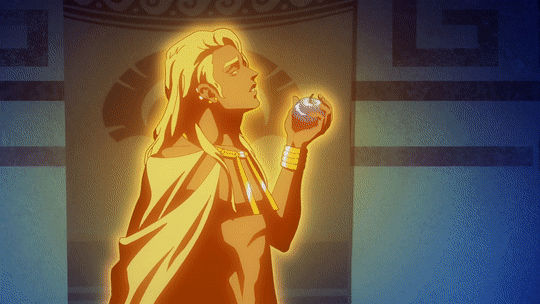
In order to determine the best way to play Apollo, I’m going to showcase how many spells they get from each group, and add on additional spells based on class features, subclass spell lists, et cetera. The ultimate goal is to try and find a balance between as many of Apollo’s spells as possible.
Bard: (4,0,1,7,3,6,8) 29 + Magical Secrets (6-8): 35-37
Cleric: (1,3,2,14,9,2,10 ) 41 + Light (6): 47, Death (4): 45, Grave (3): 44
Paladin: (3,0,0,3,5,0,2) 13 + Devotion (2): 15, Glory (5): 18, Vengeance (2): 15
Ranger: (11,0,1,3,1,0,4) 20
Sorcerer: (5,5,14,0,5,3) 32 + Divine Soul (32) 64
Warlock: (0,4,3,0,2,5,2) 16 + Celestial (8): 24
Wizard (7,6,15,0,7,7,10) 52 + Theurgy (26): 78
RACES, BACKGROUND, AND ALIGNMENT
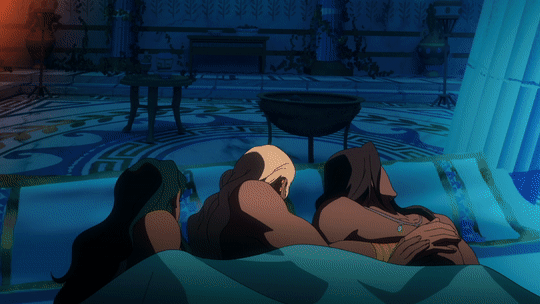
Racial Options
As an Olympian, Aasimar is a good fit for Apollo. He gains a resistance to Radiant and Necrotic damage, healing hands, and the light cantrip. Since Apollo doesn’t fly around on his own, the best choice for Apollo would the Scourge Aasimar.
Another good choice would be Variant Human. Give Apollo +1 DEX, +1 Casting Stat, take Athletics, Performance, or Perception for your skill of choice, and give him the Alert feat so he can never be surprised or Fighting Initiate to give Apollo the Archery Fighting Style if you’re not planning on giving him any Fighter levels.
Viable Backgrounds
Acolyte (Insight, Religion)
Athlete (Acrobatics, Athletics)
Entertainer (Acrobatics, Performance)
Noble (History, Persuasion)
Custom Background: Olympic Athlete (Athletics, Performance)
CLASSES, SUBCLASSES, AND BUILD OPTIONS

BARD
In terms of raw flavor, Bard is probably the best choice for Apollo, as being the god of music and poetry, as well as his numerous romantic entanglements, fits the image of the classic DnD bard. The Bard’s magical secrets also ensures that any non-Bard spell you really want can still be collected. While Bard doesn’t have the highest count of compatible spells, Bard has a nice, even distribution of Apollo’s abilities, with a little bit of almost everything. Casting with Charisma is also very on-brand for Apollo’s general depiction in media. The bard’s ability to steal any spell also means that it can exploit the Paladin and Ranger spell list specifically and swipe their high-level spells much closer to the bard’s early-to-mid level.
LORE
The Lore Bard specializes in learning and recounting tales of myths and legends, collecting information and gossip, and sharing insights to those who seek it. A rather fitting choice for the master of the Oracle of Delphi and the father of the muses. The added magical secrets is also a great choice to give Apollo more versatility in his magical abilities. The Lore bard also expands its skill list, which is fitting for the overly talented god of music.
VALOR
The bard of the Battlefield, the added focus on melee combat means that this build option is a good fit for not neglecting Apollo’s mastery of archery as a major component of combat without needing to take levels of fighter.
CLERIC
A very good contender for the build, Cleric is the only class out of all of the options that got at least 1 spell in all 8 categories. As Apollo is the god of healing and medicine, Cleric provides the biggest selection of healing spells, as well as the most radiant damage. Clerics have good Hit Die, and with enough Constitution can withstand damage long enough to aid and heal themselves and others. They get access to plenty of divination spells to call upon the help of the gods and the forces of luck and fate at play in the universe to guide them. On the character level, Apollo does seem like the sort of god that would worship himself.
LIGHT
Far and away Apollo’s best choice for building him as a Cleric, Light gives Apollo access to more fire spells to fit his solar theme, and the ability warding flare is rather fitting for the god of light to use.
RANGER
If Apollo didn’t have so many other abilities, Ranger might have been a great choice for him. If you want to fixate entirely on his role as an archer and a hunter god, then by all means, Ranger is a fitting choice for Apollo in that respect. But when taking the whole of his mythos into consideration, it leaves too much on the cutting room floor, and the only real reason I’d consider giving him Ranger levels is that Hunter’s Mark helps encourage him to use his archery skills more.
SORCERER
Honestly, this one might have had a chance if not for Sorcerer’s abysmally small spells known. Thanks to a lack of subclass spells and having to stretch 15 spells across 9 spell levels, the Sorcerer walks away with the smallest spell list of ALL the primary casting classes. It doesn’t matter that Divine Soul Sorcerer gives Apollo access to a wide variety of spells because his miniscule spell book means that he can’t flex that variety whatsoever.
DIVINE SOUL
I wouldn’t advise building Apollo as a sorcerer, but if you’re set on Sorcerer, the Divine Soul is the best possible origin for Apollo, as it gives him access to radiant, fire, divination, healing, and ‘disease’ spells.
WARLOCK
Warlock is a surprisingly decent pick, especially if you’re playing a mortal that obeys Apollo, or even if you’re as Apollo himself swearing fealty to Zeus, Helios, or some other celestial entity. By making Apollo’s pact boon the Pact of the Blade, Apollo can make his pact weapon a bow and arrow, and unlike the Paladin smites, the Warlock can Eldritch Smite with their bow.
CELESTIAL
Like Ranger, the Warlock prioritizes Apollo’s skill with a bow over a lot of flashy magic, but unlike the Ranger, by following the Celestial patron, Apollo gets a rather decent assortment of radiant spells and healing spells. It can’t compare to the shere volume of the full casters, but it certainly works in Apollo’s favor.
WIZARD
Due largely to the Wizard’s massive spell list, it’s not surprising that Apollo actually has an impressive variety of spell options that work for a Wizard build. Lore wise, Apollo as a wizard makes some sense, as Apollo is considered to be clever and wise, even if he is not the single smartest god on Olympus. However, that wide range of magical power comes with two shortcomings: Wizards can’t learn healing spells, and it abandons his archery skills by the side of the road.
BLADESINGER
While the bladesinger does seem to favor melee combat, nothing says that you couldn’t multiclass a little with Fighter or Ranger to give Apollo Archery fighting style and prioritize Apollo’s bow as a bladesinger. Everything else works rather nicely, giving Apollo additional speed, AC, magical power, striking power, and attacks. If you’re hellbent on Apollo being a Wizard, but you still want to give him the melee option, the Bladesinger is the best option to do this with.
DIVINATION
Probably the wizard subclass everyone would assume for Apollo, Divination is one of Apollo’s primary gimmicks, and the portents of the Divination Wizard are ridiculously overpowered. It’s amazing, and the kind of game-breakingly good skills you’d expect when fighting the god of prophecies.
THEURGY
Although technically UA and no longer valid, if your DM will permit the Theurgy Wizard, this is the only way to play Apollo as both a Wizard, and as a god of healing and medicine. Furthermore, Apollo can straight up steal domain features from the cleric domain he chooses, and unlike the Cleric where the choice of Light is obvious, the Theurgy Apollo has a little more wiggle room, since he already gets access to most of the spells we chose Light for. As such, Apollo could choose Life to supercharge his healing, Grave to keep people from dying, or even War to be better adept at fighting with a bow. The choice is really yours and how you feel Apollo works best as a build.
BUILDING APOLLO AS: A VALOR BARD
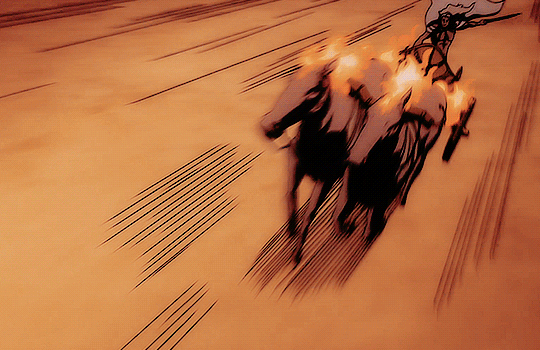
Race: Scourge Aasimar (+2 CHA, +1 CON)
Background: Entertainer (Acrobatics Athletics, Performance)
Class: Fighter (1), College of Valor Bard (19)
Skills: Animal Handling, Medicine, Perception, Survival
Alignment: Chaotic Good
Fighting Style: Archery
Number of Attacks: 2
Damage Resistances: Necrotic, Radiant
Instrument Proficiency: Lyre
STATS
STR 10 DEX 20 CON 14 INT 8 WIS 10 CHA 20
Skill Expertise (4):
Athletics
Medicine
Perception
Performance
Bardic Magical Secrets (6):
4 Divination
5 Swift Quiver
5 Contingency
6 Sunbeam
8 Sunburst
9 Mass Heal
Apollo’s Spell List
C Dancing Lights, Light, Mending, Message, Vicious Mockery
1 Cure Wounds, Detect Magic, Hunter’s Mark, Faerie Fire, Thunderwave
2 Lesser Restoration, Locate Object, Shatter
3 Clairvoyance, Mass Healing Word
4 Locate Creature
5 Greater Restoration, Mass Cure Wounds
6 True Seeing
7 Regenerate
8 Power Word: Stun
9 Foresight
BUILDING APOLLO AS: A LIGHT CLERIC

Race: Variant Human (+1 Wis, +1 CON)
Background: Entertainer (Acrobatics Athletics, Performance)
Class: Ranger (2), Light Domain Cleric (18)
Skills: Animal Handling, Medicine, Perception, Survival
Alignment: Chaotic Good
Fighting Style: Archery
Feats: Alert
STATS
STR 8 DEX 16 CON 18 INT 8 WIS 20 CHA 10
Domain Spells:
1 Burning Hands, Faerie Fire
2 Flaming Sphere, Scorching Ray
3 Daylight, Fireball
4 Guardian of Faith, Wall of Fire
5 Flame Strike, Scrying
Apollo’s Spell Book
C Light, Sacred Flame, Spare the Dying, Thaumaturgy, Word of Radiance
1 Cure Wounds, Detect Magic, Guiding Bolt, Hunter’s Mark, Inflict wounds
2 Augury, Lesser Restoration, Locate Object
3 Aura of Vitality, Clairvoyance, Revivify
4 Aura of Life, Divination, Locate Creature
5 Contagion, Dawn, Greater Restoration, Mass Cure Wounds
6 Harm, Heal, Sunbeam
7 Fire Storm, Regenerate
8 Sunburst
9 Mass Heal

I won’t go through the process of building the Warlock or the Wizard, as I only decided to build the two I felt had the strongest case, but I think Apollo came out fairly well considering the monumental task of cramming so many skills and abilities into a single playable character without cheating. Apollo is certainly a tricky god to build, but one that I feel came out pretty well.
#apollo#apollo cabin#apollon#theoi#hellenism#hellenic apollo#apollonian#greek god apollo#blood of zeus#boz#lester papadopoulos#trials of apollo#greek mythology#phoebus#phoebus apollo#dnd 5e#dungeons & dragons#Dungeons and Dragons#dnd 5th edition#dnd fifth edition#will solace#solangelo#SMITE#Smite war of the gods#smite apollo
146 notes
·
View notes
Text
— OC NAME MEANINGS
i was tagged by the loveliest @chuckhansen, @leviiackrman, @honeysides, @loriane-elmuerto , @scungilliwoman, @johnnycranes and @preachercuster to share the meanings of my ocs names! thank you dears ur all the sweetest!
TAGGING: @griffin-wood, @themysteriouslou, @starsummoners, @jmiacolt, @kenabres, @florbelles, @lustyargonianmaid, @jackiesarch, @taliaferros, @maeflower, @shellibisshe, @yennas, @amistrio, @roberthouses, @lacunafiction and anyone that would like to do this or would like to do a round two! 🖤🥀
(x.x)

POLINA is a russian, ukrainian, bulgarian and greek form of paulina/apollinarya. paulina, has origins meaning "small" or "humble" in latin. apollinarya originates from apollo meaning strength, father lion or light, and “to destroy” and the name of greek god of sun and light.
VELICHKOVA is the feminine form of velichkov meaning “son of velichko” derived from the slavic word veliku meaning “great” polina changes her surname from her mother's maiden name VODENICHAROVA (meaning “miller" in bulgarian) after being accepted as her father’s daughter and heir.

THALASSIA is of greek origin from the word thalassa, meaning “the sea.” and represents the personification of the sea, namely, the mediterranean. and is sometimes considered the mother of aphrodite. ISET means “(she) of the throne” and is associated with the goddess of sky and nature in egyptian mythology.
MEDE is most likely derived from the anglo-saxon word meaning “meadow.” this was the name chosen by the once known royal family of the shuriman empire. a near millennia ago, it was adopted after their departure from their ancestral home, following the betrayal and assassination of their ancestor azir, the god emperor of shurima. and consequentially, the fall of their empire as a result.

BELLONA is of roman mythological origin meaning “to fight” this was the name of the roman goddess of war, a companion of mars. GIOVANA is the portuguese brazilian variant of the italian name giovanna, which originates from the name john that means, “god is gracious”
BANCROFT is derived from old English bean meaning “bean” and croft meaning “small enclosed field"

ZELDA is the short form of the english name griselda that adopts the germainic elements gris “grey” and hild “battle.” this was the name of a patient wife in medieval folklore. zelda would be more associated with the battle portion than being a patient wife if anyone who knows her can attest to that... maybe someday. that day will not be anytime soon if she can help it.
EXPÓSITO is the spanish cognate of esposito that means "exposed" in italian.

MORGAINE is the french form of morgan which means “born of the sea.” and is associated with the arthurian sorceress morgan le fay. morg's mom was a computer hacker based out of new reno, and found the name from a login of the last user of a computer she hacked while on a job. it fits her though, she’s widely known for her beautifully enchanting voice in the mojave that can charm the hardest of hearts.
MOONE is a given name and a variant of word and name moon. it has origins in the old english mōna. and was also the last name of the last user on that computer.

YELENA is the russian form of the name helen, originating from hellene meaning “torch,” “corposant,” or the related name selene meaning, “moon.” james’ grandmother was named helen and catherine’s family had come by submarine to the capital wasteland from russia on a research mission into the mutations of the flora and fauna as a result from the nuclear warheads.
VORONIN is derived from russian vorona meaning "crow".

LÍADÁIN is of irish origin, the meaning possibly originates from líath meaning “grey” in an old tale it was the name of a poet turned nun, but missed her lover cuirithir to the point she died of grief.

EDELGARD is a german name derived from the germainic elements adal “noble” and gard “enclosure.” the majority of her mother sibylla’s family resides in berlin and she was named after her great aunt, a pianist and student of the great composer and pianist himself johannes brahms. musical talent truly runs through her veins. HEDY is a german and dutch name that means “battle” and “combat” her parents decided on the name as a nod to eddie's german and dutch heritage.
VANDERWEYDEN is of dutch origin and is a variation of van der weijden meaning “from the meadows.” her father lourens and the entirety of his handsomely wealthy family live in amsterdam and rotterdam, primarily the former.
#only if u want to though! 🖤#hi i have the most adoration for all of you THANK U FOR THE TAG i loved this SO MUCH to get to tell yall their names and meanings!#c. polina velichkova#c. thalassia mede#c. bellona bancroft#c. zelda expósito#c. morgaine moone#c. yelena voronin#c. líadáin talovaire#c. edelgard vanderweyden#eddie baby you are a BORN musician BRAHMS?! was who ur grandma learned piano from? THE? BRAHMS?!#tali was BORN for a throne it says right there in her middle name! it's what she deserves!#so with morg in her family nobody has the same last name and that was done deliberately!#in case AS IT IS THE WASTELAND and ur bound to step on someones toes so there arent ways to hurt someone in the family to get to them#<- so they all have different last names! it's a insurance thing u know>#WHEEZE at zelda bb girl is NOT a patient lady and if anyone can vouch (the seeds) she doesnt go down without a FIGHT for sure!#exposed for still being in love with john HA jhdjhbw i love zelda still though!!!! we still love you sweetheart!#heheheh polly being named the destroyer and the great we LOVE to see a lady thrive! rule gotham! or destroy it! the choice is yours babey!#leg.ocs#leg.tagged
20 notes
·
View notes
Photo
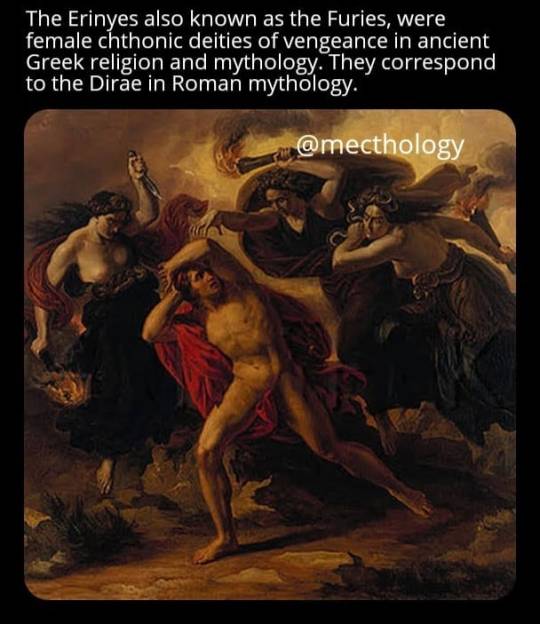
Erinyes from Greek mythology.
A formulaic oath in the Iliad invokes them as “the Erinyes, that under earth take vengeance on men, whosoever hath sworn a false oath”. It is suggested that they are “an embodiment of the act of self-cursing contained in the oath”.
According to Hesiod's Theogony, when the Titan Cronus castrated his father, Uranus, and threw his genitalia into the sea, the Erinyes (along with the Giants and the Meliae) emerged from the drops of blood which fell on the earth (Gaia), while Aphrodite was born from the crests of sea foam. According to variant accounts, they emerged from an even more primordial level—from Nyx (“Night”), or from a union between air and mother earth, in Virgil's Aeneid, they are daughters of Hades.
Their number is usually left indeterminate. Virgil, probably working from an Alexandrian source, recognized three: Alecto (“endless anger”), Megaera (“jealous rage”), and Tisiphone (“vengeful destruction”), all of whom appear in the Aeneid.
The Erinyes live in Erebus and are more ancient than any of the Olympian deities. Their task is to hear complaints brought by mortals against the insolence of the young to the aged, of children to parents, of hosts to guests, and of householders or city councils to suppliants—and to punish such crimes by hounding culprits relentlessly. The Erinyes are crones and, depending upon authors, described as having snakes for hair, dog’s heads, coal black bodies, bat’s wings, and blood-shot eyes. In their hands they carry brass-studded scourges, and their victims die in torment.
Follow @mecthology for more myths and lore.
DM for pic credit or removal.
https://www.instagram.com/p/CV-ffVyoe1Q/?utm_medium=tumblr
#erinyes#greek mythology#greece#nyx#cronus#gaia#punisher#deities#ancient#pagan#heathen#mythology#mecthology#mitologia#knowledge
16 notes
·
View notes
Text
Blue lions name etymology:
Many of the blue lions' names have western European origins and have many connections to Gods, Saints and Christianity (perhaps because the Kingdom takes their religion and the crest system so seriously)
(side note, I updated the black eagles one, so check it out if you want!)
Dimitri Alexandre Blaiddyd-
Dimitri: alternative spelling of Demetrius, "devoted to Demeter" (Greek Goddess of the harvest, caused winter after becoming depressed every time her daughter left for the underworld), which was a name given to many kings. Could also relate to the martyr Saint Demetrius, who was depicted wearing armour and holding a spear and died from multiple spear wounds.
Alexandre: "defender of men", also given to many kings
Blaiddyd: "wolf-lord", a legendary king of Briton who was known for encouraging necromancy. He was sent to Athens by his father to learn liberal arts, and the city he founded (Bath) was dedicated to Athena/Minerva, goddess of knowledge and war
Dedue Molinaro-
Dedue: could have origins in the Nubian god Dedun, god of incense and protector of dead Nubian rulers and their funerary rites, who was often depicted as a lion. It could also be related to the name Dudu, originating from Eduardo meaning "guardian of riches"
Molinaro: from the Italian word 'Molino' meaning "mill"
Felix Hugo Fraldarius-
Felix: "lucky, successful"
Hugo: "heart, mind, spirit", may have been chosen because of the link to Victor Hugo's 'Les Miserables' with the character Fantine
Fraldarius: The closest anyone can find is 'Fraldario' in Portuguese, meaning "diaper" 😬. If anyone can find something better PLEASE let me know
Ingrid Brandl Galatea-
Ingrid: from the old Norse 'Ingríðr' meaning "Ing is beautiful", Ing or Yngvi is an older name for the god Freyr, god of peace, fertility, rain and sunshine
Brandl: from the Germanic name 'Brando', derived from the element Brand meaning "sword" or "fire", and the crest of Daphnel is from the flame dragon
Galatea: "she who is milk-white" (comes from the myth of Pygmalion, who sculpted a statue of a woman, turned human by Aphrodite, but there were many Galateas in Greek mythology)
Sylvain Jose Gautier-
Sylvain: derived from Sylvanus, Roman god of the countrysides. He was also associated with Pan, god of the wild, shepherds and mountains, but also sex
Jose: Portuguese form of Joseph, "he will add", sometimes used as a feminine middle name
Gautier: French form of Walter, "ruler of the army"
Mercedes Von Martritz-
Mercedes: "mercies", from the Spanish name of the Virgin Mary, María de las Mercedes, "Mary of Mercies"
Martritz: the closest anyone can find is Martlet, meaning "little martin", martlet birds represent swiftness of travel or fighting on the battlefield and martin birds represent a connection to the divine and good luck
Annette Fantine Dominic-
Annette: diminutive of Anne, derived from Hebrew 'hannâ' meaning "grace, gracious"
Fantine: "free", "childlike" or "infant", a character in Les Miserables who was a beautiful and naive girl until she was forced into prostitution for her child
Dominic: from Latin Dominicus, meaning "of the lord", also the name of Saint Dominic, who was described as having reddish hair, beautiful eyes and a pleasingly resonant voice
Ashe Duran-
Ashe: "ash tree", also another spelling of Yoruba concept meaning "the power to make things happen and produce change"
Ubert: could be a variant of the surname Uber, meaning "active, busy, enterprising", or Ebert which comes from the German word for boar. This could also be another variation of Hubert, so as I said in the last post, "bright heart/mind". Ashe's Japanese surname, Duran, means "enduring"
#fire emblem three houses#fe three houses#blue lions#dimitri alexandre blaiddyd#dedue molinaro#felix hugo fraldarius#ingrid brandl galatea#sylvain jose gautier#mercedes von martritz#annette fantine dominic#ashe duran#etymology
193 notes
·
View notes
Note
I have been doing some research on Theoi.com and found out that when Zeus was young (growing up in Crete), he had a mentor who was called Olympus.
Ptolemy Hephaestion, New History Bk2 (trans. Pearse) (summary from Photius, Myriobiblon 190) (Greek mythographer C1st to C2nd A.D.) :
"The tomb which passes for that of Zeus in Krete (Crete) is that of Olympos (Olympus) of Krete, who received Zeus son of Kronos (Cronus), raised him and taught divine things to him; but Zeus, he says, struck down his foster-parent and master because he had pushed the Gigantes (Giants) to attack him in his turn; but when he had struck, before his body he was full of remorse and, since he could appease his sorrow in no other way, he gave his own name to the tomb of his victim."
[N.B. The Gigantes of this myth were probably the Kouretes (Curetes) or perhaps the Titanes.]
Since I don't see any other sources talking about this guy, I'm pretty sure this wasn't universally accepted by the ancient Greeks in their main mythology or religion, but I'm curious to hear your thoughts.
Haha, oh, yeah, this guy (also/probably Ptolemaeus Chennus) and this particular book is not the best source to go for anything that was probably true variants of myth. I've read through Photius' epitome of his New/Strange History, and it contains some... interesting... things. (For some examples; the one note of Paris and Helen having a girl child, since their various amount of and variously named sons aren't mentioned only here, or where Helen is the daughter of Helios instead, and the one note of the golden vine usually mentioned as one of the gifts Zeus gives Ganymede's father for him, here instead being given to Priam because he and Zeus are sleeping together, much like Hecuba and Apollo are).
I wouldn't argue using this book as anything but for the tiniest details that aren't contradicted elsewhere (he has Aphrodite give Paris a lyre, which she won in a contest Apollo held, which I mostly like because of the whole "god giving a gift to a valued mortal" part, and it really doesn't matter in the long run). Not that one COULDN'T use the mythological information in this book in preference to more well-known details, of course, but, y'know. xD
In this case, while there's no real reason not to use this guy for Zeus' guardian if you really don't want to use any of his other, more usual ones (which, setting aside the goat, could be a couple nymphs and/or the Kouretes), this bit is technically to "explain" why the Cretans had a tomb that was said to be Zeus'.
But yeah, definitely not universally accepted!
6 notes
·
View notes
Text
And here I was, thinking that Stone Blind was a terrible Medusa retelling... apparently I did not know what it means for a Medusa retelling to be truly, genuinely, undeniably terrible until now. Consider the following concepts:
- The most important and the one constant detail in every variant of Medusa's story, her beheading by Perseus, is a lie actually. In fact, basically all you think you know about Medusa is untrue, including her parentage. Poseidon raping Medusa and Athena punishing her are true, however.
- Athena is "insane" and "a psycho bitch" (the words of the characters, not mine) and gods like Hermes and Aphrodite and Hades and, hell, most of them, seem unable to talk about her without throwing an insult her way. It is like this book's author has projected the image of her middle school bully onto this goddess and is determined to take revenge. I have never seen such a demonized and flanderized version of Athena in my entire life, not even close. It made me genuinely offended on her behalf. Oh and also, the reason she hates Medusa so much? Well, you see, Athena is in love with Poseidon and they have a secred affair at some point, but then he becomes completely yandere for Medusa and she is all he cares about, so Athena is a scorned woman, a crazy jealous ex girlfriend. That's all there is to it.
- Hermes, Aphrodite, Hades and Persephone are saintly gods who are oh so horrified about the fact that other gods rape and punish innocents. It is really hilarious to read about Hermes, who in the source material raped a girl and did nothing when her brother killed her for it , go on rants about how evil and terrible Poseidon and Athena are for what they did to Medusa. Or to read about Aphrodite claiming herself to be among those gods who refuse to participate in the abuse of innocents and don't approve of such actions, when in the myths she makes a group of brothers rape their own mother in order to get revenge on them, and is perfectly willing to destroy Phaedra's life in order to get revenge on her stepson. Of course, Aphrodite is also a loving and devoted wife to Hephaistos; Hades most certainly did not kidnap Persephone and in fact she was the one who pursued him agains her villainous mother's wishes; Hermes is (or at least was before the first sex scene) a several millennia old virgin who has waited in chaste devotion for his one true love, Medusa, to finally admit her love for him. When I say that they are saintly, I mean it. Not even a drop of moral ambiguity or complexity.
- The gods aren't promiscuous and flighty in their affections; quite the contrary, they fall in love once and remain forever and constantly devoted to that one person no matter what. 🤣🤣🤣
- Medusa is actually the daughter of Hades and Persephone, villainously and heartlessly separated from her parents by the villainous and heartless Demeter who forced Persephone to choose between keeping her daughter or being allowed to live with Hades..
And Speaking of Hades, it is so very heartwarming to read scenes where this god, most notorious for violently dragging a young girl into the underworld to be his wife, insults and hits goddesses. But worry not, Athena and Demeter are evil, so it's all ok.
In short, I hated so many things about it. If you love Greek mythology, this might not be for you... Every time it looks like I've already found the worst Greek mythology retelling ever, I come across an even worse one. Anyways, in case any of this sounds appealing, the book is called "The Deep End of the Sea".
4 notes
·
View notes
Text
The Tale of Cadmus, legendary Thebes’ city founder and Harmonia, daughter of Ares and Aphrodite
This drawing below here is for one of the famous tales associated with Ares - the bittersweet tale of the Phoenician prince, Cadmus and Ares’s daughter, the goddess Harmonia, and the eventual founding of their own city Cadmea, now known as the modern-day Thebes. (It was also certainly one of the longest and my top favorites Greek myths as well.)
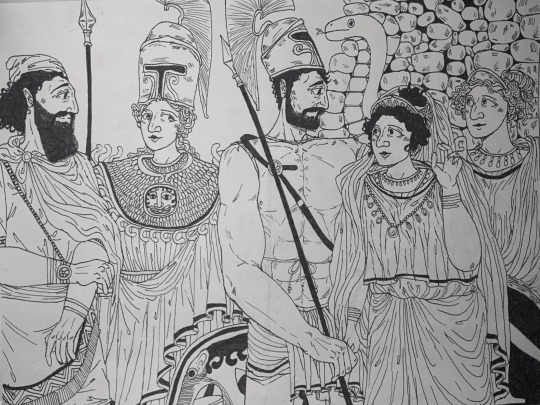
As the son of King Agenor of Tyre and Queen Telephassa, Cadmus, at first, ventured out from his home city of Tyre out to the west - to the islands of the Mediterranean Aegean Sea in order to find his lost sister, the princess Europa; who was abducted by Zeus in the guise of the white bull earlier. To make the long story short (since the story contains much smaller variant local myths), as Zeus was enamored with the beauty of Europa when she picking flowers with her accompanying nymphs, the chief of the gods transformed himself into a beautiful white bull and then directly walking towards the princess.
When she realized that the bull was no other than the King of the Olympians himself, as the bull promptly carried her off and ran across the ocean to the island of Crete, she later gave birth to three sons from Zeus, married the local king there and become the first Queen of Crete. As it is also said Europa is also the mother of the famed King Minos; therefore, the grandmother of the labyrinth princess Ariadne and the Minotaur monster itself.
Distraught and devastated by the mysterious disappearance of his dear daughter, King Agenor entrusted and ordered four sons - Phoenix, Cadmus, Cilix, and Thasus - to find more information and news about his daughter’s mysterious disappearance. While Phoenix was the first one who easily gave up the quest and settled in a new city in an area that called Phoenicia, his brothers Cilix and Thasus also likewise seemed to be giving up on the quest of their sister and founding the cities in a new area, too, founding the region of Cicilia in Asia Minor and the region of Thassos in the eastern Aegean. Cadmus’s mother, Queen Telephassa - who also seemed to be accompanied by Cadmus during the journey the whole time - unfortunately, passed away with deep grief and broken-hearted of the loss of her own daughter at Thrace.
After finishing all of the final burial rites for his queen mother, Cadmus, now all alone, seeking the final solution in the pilgrimage to the Oracle of Delphi for finding his sister. However, upon there, he was ordered to give up his quest to find his sister and to follow a cow instead - to built the city on the place where she lay down exhausted. (Where she lay down in the region of Beotia, near the Cephisus river.) Later intended to sacrifice the animal as a devotional act for Athena, for since she is the goddess of heroic endeavor, he sent some of his troops companions to look for pure freshwater for the sacrifice. However, upon discovering the purest freshwater in the Ismenian spring, the horrid serpentine-like dragon - the guardian of the spring, which often being compared to the later Lernean Hydra of Herakles - emerged from the nearby cave and killed all of his unfortunate companions with a venomous bite. When Cadmus got a hold that none of his companions had come back yet, he went looking for them and came to face to face with the angered serpent and after a fierce struggle, he managed to slay the beast. After sacrificing the cow to Athena, the goddess told Cadmus to bury the serpent’s fangs into the soil ground. As from the fangs of the serpent, grow a race of humans called the “Spartoi” (“sown men”) - who in turn later become the autochthonic rulers of the future city of Thebes for generations.
As the god of war was angered by the killing of the serpent, the hero later accepted to be worked as servitude for Ares and accepting the hands of the bride Harmonia in marriage with great fortitude- who happened to be the youngest daughter of both Ares and Aphrodite themselves. During that solemn wedding day in the city of Cadmea, the goddess Harmonia herself received the peplos costume from Athena (as the goddess Athena herself also famed for her talents/skills of weaving, too) and the famous cursed necklace from Hephaestus - who seemed to be still angry of his wife’s cheating and infidelity with Ares during that time. (Cadmus also later changed the new city’s name to Thebes, in remembrance of the older Ancient Egyptian city of Thebes, allegedly founded by his father himself.)
However, despite the family have several children Autonoe, Ino, Agave, Semele, and Polydorus (which one of them later become the mother of Dionysus, the god of wine), the misfortunes and tragedies are still constantly happened within his personal life and his family is now leading a miserable life. Semele was later burn into a crisp for having copulating with Zeus but have lack of trust in her lover. Ino was forced to jump out of the cliff and plunge into the sea with her only surviving son, as her husband Athamas was struck to madness by Hera. Autonoe’s son Actaeon killed by his own hounds In a hunting trip and Agave later killed her own son, Pentheus in the bacchanal festival with the help of Ino and Autonoe. Either all of the tragedies was caused by the cursed necklace of Hephaestus or that the serpent had finally taken its sweet revenge. When the first civil strife assailed upon the city of Thebes, the couple abdicated the throne and settled in the land of Enchelians, who happened to be in a battle with the neighboring tribe coming from Illyrians. (These two tribes here settled in an area that now located in modern-day Epirus and Albania; as well as the bordering region of Thessaloniki and Macedonia.) With Cadmus as their leader, the tribe won a victorious battle and made him their king. However, despite all of this and the arrival of newborn son Illyrios, the curses and a series of unfortunate events still casting over his family like a shadow and Cadmus himself also begins to have a strange feeling of guilt- a peculiar sensation that he would lead a happier life with no troubles if he was a serpent. Harmonia also later prayed to the gods to be shared with her husband’s fate and was also turned into a serpent. Feeling pity for the couple, the gods transformed them into a pair of serpents, forever intertwined and finally living at peace with each other at the Elysian Fields, an afterlife realm where god-favored mortals and epic heroes lived.
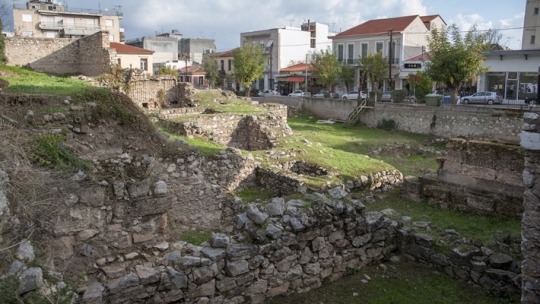
While both the historical figures Cadmus and Harmonia had now been long gone in mythology, he is still revered as some sort of “a cultural folk hero” in parts of Phoenicia (now located in modern-day Syria, Lebanon, and the Levant) and modern-day Greece. Maybe not divine in strength and resilience like the later Herakles, but is still considered as a hero, nonetheless, as a teacher/ guide who taught the Phoenician alphabet and building the Acropolis, and his marriage with Harmonia is considered as a symbol of the cultural diffusion process between the Near-East and the West - later giving the birth of the period of Classical Greek. (Which kind of a bit similar to how I imagined to my own version of Aphrodite and Ares, too, since the goddess herself is also from the island of Cyprus, which had much more Near-Eastern influences in my opinion.) Through the modern Greek language that based upon the Phoenician writing system, the alphabet writing system gave birth to the Latin of the Romans and to later Europe itself.
#ancient greek#ares and aphrodite#mars and venus#athena#minerva#cadmus and harmonia#i don’t really know the clothings of the Phoenicians so I give him a much more Assyrian look#i’m tired to give the gods some historically accurate costumes all the time so bare with me a bit on this#greek mythology#concordia#my art
9 notes
·
View notes
Text
Freya
Freya is the Norse goddess of everything feminine: love, beauty, sex, fertility, and gold. However, she was also at times associated with war and death. Her name translates to “(the) Lady.”
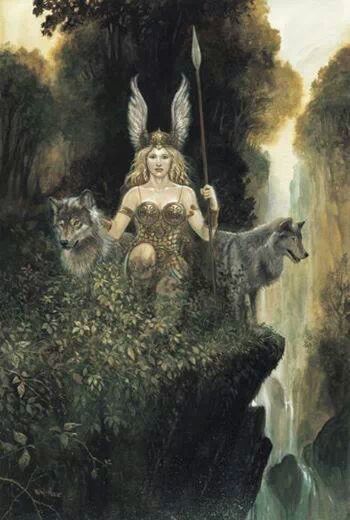
Family
The daughter of Njord, the sea god, and an unnamed mother, Freya was born into the Vanir tribe of gods, but she later became an honorary member of the Aesir gods. Her brother was Freyr and her husband Odr, with whom she had two daughters, Hnoss and Gersemi. Her brother Freyr, is associated with fine weather and good fortune, and also said to be an ancestor of Swedish royalty.
In late Old Norse literature, Odr and Odin, the father of the gods, are most likely the same person. Many theories supported by literary sources would, therefore, also have it that Freya and Frigg, Odin’s wife, are ultimately identical.
Symbols
The most common symbol associated with Freya is the Brisingamen Necklace – a necklace that sparkled and shined so beautiful that Freya was willing to go to extreme lengths to have it.
Legend states that one night, Freya wandered into the land of the Dwarfs. There, she saw four of them making the most beautiful golden necklace. She told them that she would pay them any amount of gold and silver for it.
However, the Dwarfs were not interested in money. They told Freya that the only way they would give her the Brisingamen was if she would sleep with each one of them. Freya loathed the idea of sleeping with the hideous Dwarfs, but her desire burned so strongly for the Brisingamen that she agreed to their demands. After four nights of sleeping with each one, they made good on their deal, and gave it to her.
Another symbol Freya is associated with is her golden chariot pulled by two blue cats, a gift from Thor. Sometimes she also rode the boar Hildisvini, who was her faithful companion.
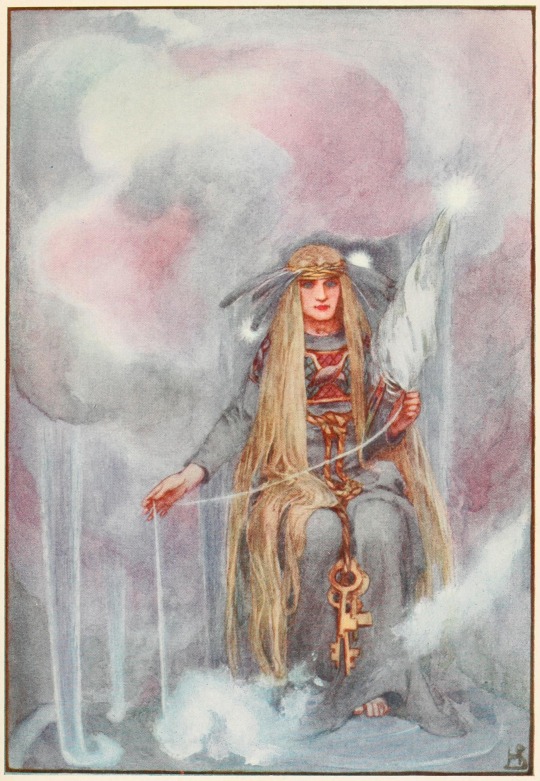
Powers & Duties
Freya is the Norse goddess of love, sex and fertility. As the goddess of love and sex, Freya was sought after by prominent Jotnar, the giant gods who were constantly at war with the Aesir. The Jotnar wanted her hand in marriage.
It is also believed that Freya was the first to bring the art of seidr, a type of sorcery practiced during the Late Scandinavian Iron Age, to the gods. She had the knowledge and power to control others’ good fortune and desires.
Another privilege Freya had was that she chose the first half of the warriors killed in battle to stay in her afterlife realm Folkvang. Odin received the other half in Valhalla, his palatial home.
Infidelity
The similarities between Freya and Frigg run deep. Both were accused of infidelity by Loki, the trickster god. In a poem in the Poetic Edda, he even accused Freya of sleeping with her brother. Similarly, legend has it that Frigg slept with Odin’s brothers, Vili and Ve.
The infidelity supposedly took place when Odin or Odr was away. Odin was known to travel far and wide within the Nine Worlds of Norse cosmology. Freya is said to have cried tears of red gold over her husband’s absence. Despite her infidelity, she searched for him wearing her magical feathered cloak, which allowed her to cover big distances quickly in the air.
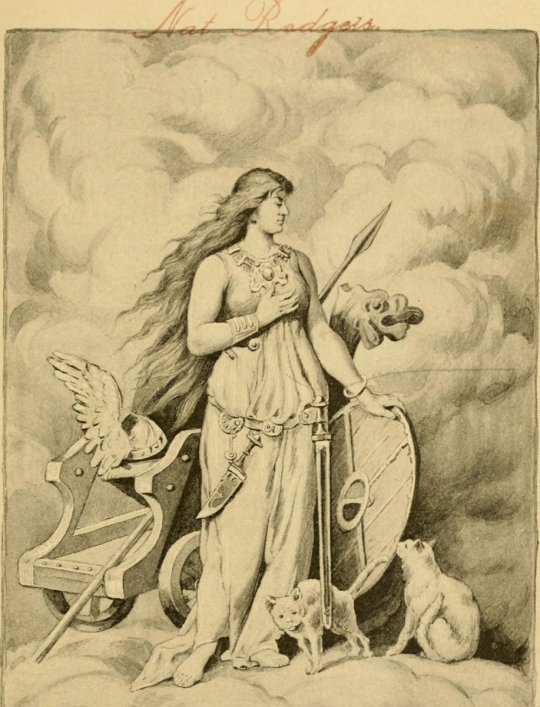
Facts About Freya
The Brisingamen was also later stolen by Loki and recovered by Heimdall, watchman of the gods;
It is unclear whether the weekday Friday was named after Freya or Frigg. One theory has it that the word for “Friday” in Germanic languages comes from Frija, a Proto-Germanic goddess who was the foremother of Freya and Frigg;
Freya had four nicknames: Hörn, Syr, Gefn, and Mardöll;
Freya allowed other gods to borrow her magical feathered cloak;
In Old Norse literature, Freya is mentioned in the Poetic Edda and the Prose Edda;
Freya’s brother Freyr is associated with fine weather and good fortune. He is also said to be an ancestor of Swedish royalty;
In her role as sorcerer or shaman practicing pre-Christian Norse magic, Freya’s social status changed dramatically depending on where she was and whom she was with;
In rural Scandinavia, Freya was thought to be a supernatural figure until the 19th century;
Freya, or a variant of the name, is still a popular name for girls in Scandinavian countries. Alone in Norway around 500 women have the first name Frøya;
Numerous places in Sweden bear Freya’s name. Many of them, including Freyjulundr, which refers to her sacred grove, are in Uppland;
In Denmark, Freya is mentioned in the first stanza of the national anthem. The line goes like this: “… it is called old Denmark and it is Freja’s hall”;
Various plants were named after Freya, including Freya’s hair (Polygala vulgaris). However, most were replaced with the name of the Virgin Mary during the process of Christianization;
Freya has been compared with the Egyptian goddess Isis and the Greek goddesses Aphrodite and Venus;
Wagner included Freya in his famous opera cycle The Ring;
Freya has been depicted in several famous works of art, including the statue Freyja by H.E. Freund (1821-1822) and the painting Freyja and the Brisingamen by J. Doyle Penrose (1862-1932).
11 notes
·
View notes
Photo
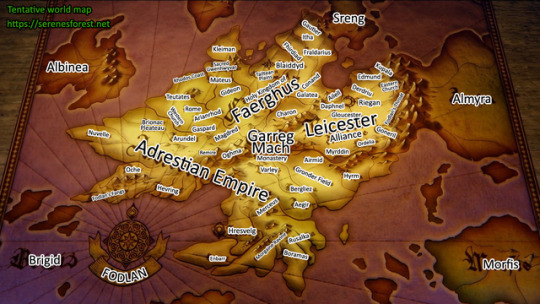
Okay! I said I was going to write up all of my findings on the sources of the Fodlan names, and I’m gonna do it! Apologies to anyone who may have already done this.
I’m going to sort this by country/continent. If anyone knows a more plausible etymology for one of these names please let me know, most of these were found through basic Google searches so I’m likely missing a lot, especially since a LOT of these names vary a bit from their sources and I only caught some of the changed ones because I was already familiar with the original. I’ll also be updating this as time goes on since I also want to cover the noble surnames that aren’t on the map.
EDITS:
Thank you @Bae-leth for pointing out that I’d gotten Faerghus and Leicester switched :’D this is what I get for whipping a long post up in a frenzy at 1am.
Added etymologies for the three nations
Added some possibilities suggested by @sunshinequeen-theresa
This is a very long post:
Adrestian Empire: From Adrestia, daughter of Aphrodite and Ares, “she who cannot be escaped” and followed Ares into battle
Brionac: After wading through pages of results about Yu-Gi-Oh, Final Fantasy, and Xenoblade, I found a Xenoblade article suggesting that Brionac is a name attached to the spear of Lugh from Irish mythology that hasn’t really appeared anywhere outside of Japanese media
Arundel: The only hits for Arundel I got pertained to a few towns, but I hypothesize that it’s connected to Arondight, Lancelot’s sword
Remire: I found that Remire is the name of an island in Seychelles, which could be the etymology, but let me know if there’s something else out there
Oghma: Champion of the Tuatha De Dannan from Irish mythology
Varley: WIkipedia says that Varley is a surname- either English of Norman origin, or Irish or Gaelic origin (paraphrased from Wikipedia)
Airmid: A goddess from Irish mythology
Field of Gronder: When I put “gronder” into Google I was told that it means “to scold” in French; there may be another etymology but with so many names to get through I couldn’t hunt it down
Hyrm: Hyrm is the name of a Marvel comics Asgardian, but Hrym is a Jotun who captains Naglfar in Norse mythology, so it might be a misspelling
Bergliez: Berglez seems to be a German surname
Aegir: A Jotun of Norse mythology associated with the sea
Merceus: Seems to be a surname; couldn’t find much information on it
Hresvelg: Hraesvelgr was a giant that turned into an eagle in Norse mythology
Enbarr: A horse from Irish mythology that could run across water
Morgaine: An alternate name for Mogan le Fay
Rusalka: A Slavic feminine water spirit
Boramas: Borama is a major city in Somalialand, which could be the etymology, but let me know if there’s something else out there
Hevring: One of the daughters of Aegir and Ran from Norse mythology
Oche: Oiche is Irish for “night,” which seems to me more likely an etymology than “the line behind which darts players stand,” which is apparently what “oche” means
Nuvelle: All I could find was a laminate flooring company, so does anyone out there know what else it could mean?
Faerghus: Fearghus/Fergus is a common Scottish name, but I found a Saint Fergus, which might tie into Faerghus’s status as the Holy Kingdom
Teutates: According to a Roman poet, Teutates was a Celtic god of war
Rome: …Rome
Arianrhod: A Welsh goddess from the Mabinogion
Gaspard: A French given or surname, couldn’t find much more than that sadly
Magdred: I couldn’t find anything for Magdred, though a madrigal is a kind of Renaissance song?
Charon: Ferried the Greek dead across the River Styx in the underworld
Galatea: A statue brought to life by Aphrodite after its sculptor fell in love with it
Gideon: One of the Judges of ancient Israel
Rhodos: According to Wikipedia, Rhodos was the personification of the island of Rhodes, wife of Helios, possibly a daughter of Aphrodite
Sacred Gwenhwyvar: A Welsh spelling of Guinevere
Mateus: All I could find for Mateus was a kind of Portuguese wine, anyone else know an alternate source? EDIT: It has been suggested to be a variant of Mathaus, a German surname
Kleiman: Seems to be a German surname that just sort of means “short person"
Tailtean Plains: Named for Tailtiu, thought to be the name of a Irish goddess
Blaiddyd: A legendary Britonic king who encouraged the practice of necromancy, and whose son Leir was the inspiration for the play King Lear
Conand: Probably from an alternate spelling of Connacht, an ancient Irish kingdom
Fraldarius: Every hit on Google related to FE16 in some way, if anyone knows the source, please let me know!
Fhirdiad: A Connacht warrior and friend of fellow Irish legend Cuchulainn
Itha: All I can wildly guess is that it’s short for Ithaca from the Odyssey?
Gautier: Apparently a French variation of the name Walter
Leicester: According to Wikipedia, Leicester is one of the oldest towns in England
Kupala: An Eastern European summer solstice celebration
Edmund: Edmund, son of Duke Gloucester from Shakespeare’s King Lear
Derdriu: Another spelling of Dierdre, likely named for “Deirdre of the Sorrows” from Irish mythology (thank you FE Wiki)
Regan: Regan, daughter of King Lear
Gloucester: The Duke of Gloucester from Shakespeare’s King Lear
Goneril: Goneril, daughter of King Lear
Ordelia: Likely named for Cordelia, daughter of King Lear
Myrddin: The Welsh spelling of Merlin
Ailell: Wikipedia has it as the name of various Irish kings and abbots
Daphnel: I couldn’t find a source for this one, if anyone knows please let me know! EDIT: It has been suggested to be based on Daphne, a nymph who was turned into a laurel tree in Greek mythology
Continents:
Fodlan: Fodla was a major Irish goddess, and Fodla was occasionally used to reference Ireland itself
Sreng: A champion of the Fir Bolg from Irish mythology
Albinea: Sounds like it comes from Albion, and old name for the island of Britain
Brigid: An Irish goddess
Morfis: Morfis and Morfi are apparently surnames (Morfis might be Cypric, not sure baout Morfi), and I couldn’t find any details about them and I suspect this one is actually another reference to Irish, Welsh, or Britonic legends
Almyra: The closest possible etymologies I could find were Almira (a German opera) and Almyros (an ancient Thessalonian city)
Surnames not on the map:
Bestla: Mother of Odin from Norse mythology
Molinaro: An Italian surname meaning “miller"
64 notes
·
View notes